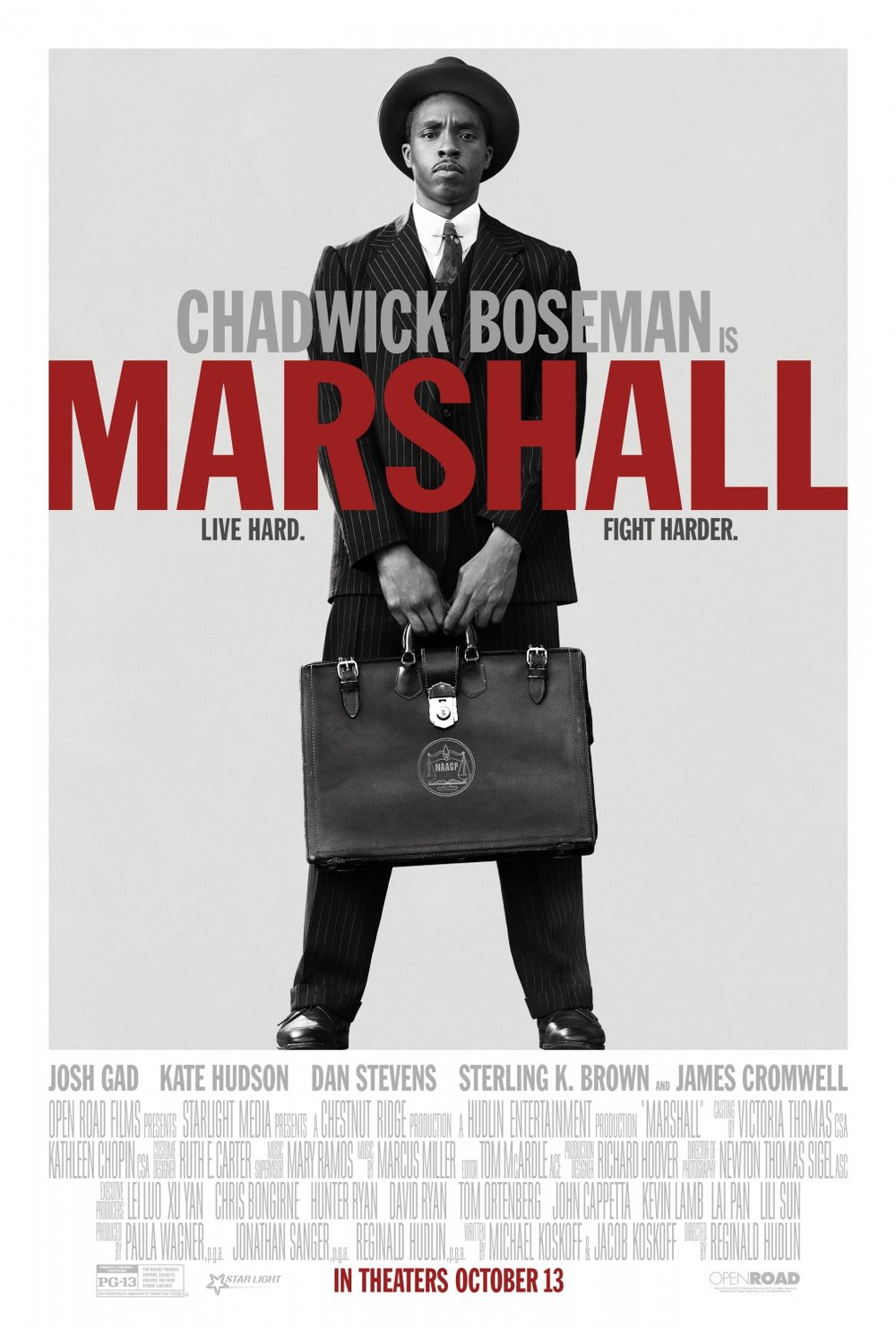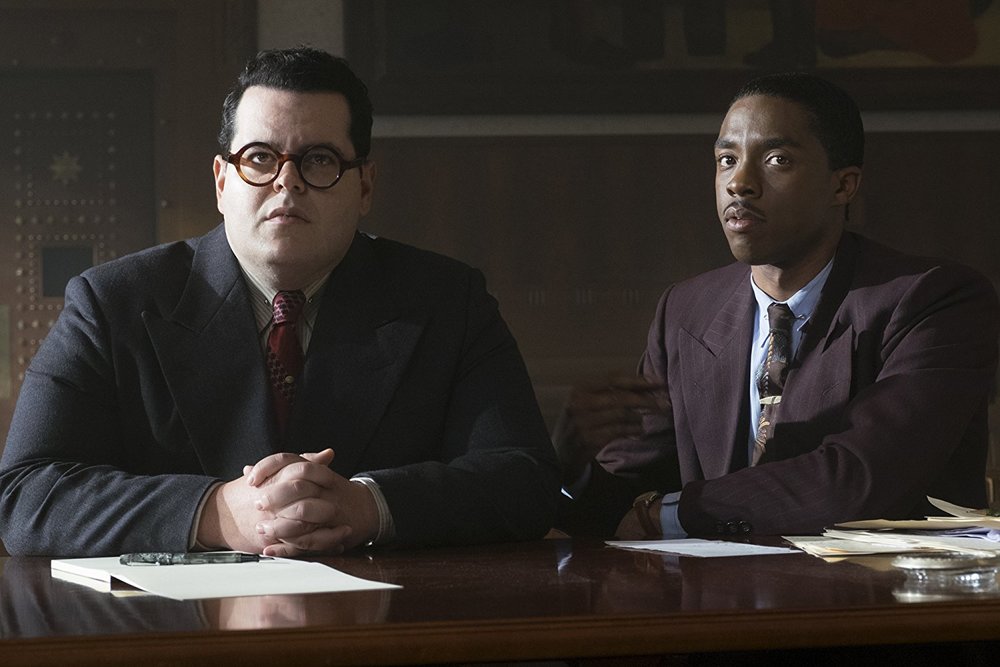Marshall (2017)


SHOULD I SEE IT?
YES
The first theatrical film to feature Thurgood Marshall, this is a movie long overdue.
Stellar performances make this film infinitely watchable.
A film that, if it finds an audience, could be a crowd pleasing hit, timed to make an impact during Oscar season.
NO
If the movie is called Marshall, and is supposed to be about Thurgood Marshall, why does the movie seemingly treat its subject like a secondary cast member in key moments?
Plays things very safe, lacks bite, and will easily fit comfortably on cable television in the years to come.
A movie that lacks historical heft, while the particulars of the case at the heart of the movie is interesting, Thurgood Marshall's legacy deserves something deeper and better made.
OUR REVIEW
The story of Thurgood Marshall arrives at a seemingly perfect time in 2017. With culture war intensities rising and communities across America speaking out about racial discordance, Marshall, a biopic on the first African-American Supreme Court Justice is something we should pay attention to.
For viewers anticipating a traditional biopic, or more of a summary of a life story, a surprise awaits: Marshall opts to instead focus on the attorney's assistance and guidance on a 1941 civil rights case, The State of Connecticut v. Joseph Spell (1941).
Portrayed by the terrific Chadwick Boseman, a 33-year-old Marshall arrives in 1941 Connecticut, at the behest of the NAACP, to work with an insurance defense attorney, Sam Friedman (Josh Gad). The pairing comes about with news that Friedman is somehow tasked with defending African-American chauffeur Joseph Spell (Sterling K. Brown) in a rape and attempted murder case. The staggering allegations of criminality are made by white socialite Eleanor Strubing (Kate Hudson), Spell's employer, and a woman widely regarded in her community.
Can this case be more cut-and-dry?
Complicating matters, Marshall and Friedman do not hit it off initially, and in a racially segregated America, Marshall is told by the judge (James Cromwell) that only attorneys licensed to practice in the state of Connecticut can address the court. This thereby renders Marshall mute and immediately left to assist an ill-prepared and nervous white attorney, more concerned with his reputation and career, than the livelihood of his client.
Marshall is the first film directed by Reginald Hudlin in 15 years (after leaving theatrical films to work in television), and the screenplay is written by Jacob Koskoff and his father, first-time screenwriter and civil rights lawyer, Michael Koskoff. This creates an interesting team assembled to tell the Thurgood Marshall story and gives rise to much of what ails this well-intentioned, if clumsily constructed film.
Hudlin's film routinely looks and feels like an episode of a mythical series called "Law & Order: Legendary Court Cases." The courtroom looks TV ready and clean, with varying hues of brown-colored wood and beaming sunlight shining just perfectly through the windows. The movie leans heavily on procedure and spends almost as much time in the courtroom as it does outside of it. As we watch the court case unfold, we see flashbacks and the stories, as told by accuser and accused. For those into these types of true crime recreations and episodic stories, Marshall proves to be relatively compelling theater and will likely please a fair amount of moviegoers.
And yet, it is not unfair to wonder just what kind of movie we are watching?

The film frequently checks in with Marshall has a centering force, but then pivots off of him to focus intently on Gad's character. We see the tragic, and increasingly astonishing truth about what took place between Spell and Sturbing on one particular fateful evening, and the movie depicts Spell as a scared adversary of sorts, who Marshall and Friedman have to continually mine for more and more information. A subplot involving a young female juror (Ahna O'Reilly) only adds to the television melodrama of the piece and Hudson proves to be a frequent cutaway for Hudlin, reminding us of the stakes at play when a wealthy white woman accuses a black man of such heinous crimes and activities.
Somehow, Hudlin and the Koskoffs deliver a script that struggles to find its voice. The acting is largely top-notch, especially from Boseman, who continues to show great range in portraying a third iconic African-American celebrity, following his star-making turn as Jackie Robinson (42) and an underrated performance as James Brown (Get On Up!). Gad is good here, serving as a co-lead, while Emmy winner Brown and Hudson strike a strong connection on screen.
Through and through, the pieces are in place for a potentially great film. By isolating Marshall's story to something of a look at basically one seminal case in his young career, we are left to try and understand the scope of his legacy. We receive truncated moments away from the case and the courtroom, making it hard to give agency to Marshall's larger vision and desire to do his work. At times, the movie makes Friedman the focus for significant stretches and Marshall seems to struggle to understand the story it is trying to tell.
Parallels certainly existed in a World War II-era legal setting where Jewish and African-American attorneys are forced to come together to save the life of a seemingly innocent man. Some have called Marshall a superhero origin story, nodding and winking hard to Boseman's forthcoming entry in the Marvel Cinematic Universe, where he will star as the Black Panther. That superhero analogy is not far off - the Koskoffs fertilize the comparisons when, prior to the jury returning a verdict, Marshall gets the call to travel to another jurisdiction and begin work on another civil rights case.
It is hard to dismiss Marshall. Hudlin and team have their hearts in the right place and have made a pretty solid film. The movie does inform its audience on a significant case in Marshall's career and in the American civil rights movement. And yet, it is a shame that Marshall's iconoclast life and historic achievements are left to title cards as Andra Day and Common's rousing gospel-tinged duet "Stand Up for Something" begins populating the end credits.
Earning a passive recommendation, largely for the acting and the larger implications of the story we do get, Marshall is a movie which could have been and should have been so much more.
CAST & CREW
Starring: Chadwick Boseman, Josh Gad, Kate Hudson, Sterling K. Brown, Dan Stevens, James Cromwell, Keesha Sharp, Roger Guenveur Smith, Ahna O'Reilly, Jussie Smollett, Rozonda "Chilli" Thomas, Andra Day, Jeremy Bobb, Sophia Bush.
Director: Reginald Hudlin
Written by: Jacob Koskoff, Michael Koskoff
Release Date: October 13, 2017
Open Road Films
